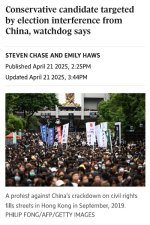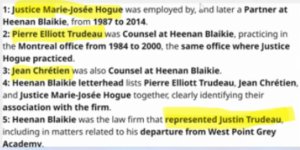In an incident last month that may soon be considered ominous foreshadowing, Prime Minister Mark Carney was pressed by the media about his financial holdings and the ethical conundrums that they present. To change the subject, Carney boasted about his recently acquired security clearance, and claimed it was irresponsible for the leader of the Opposition not to obtain one himself.
This criticism flirted with the conspiracy theory that Conservative Leader Pierre Poilievre would fail a background check, which ignores the fact that Poilievre received his security clearance after becoming a cabinet minister in 2013, demonstrating that there had been no concerns by security and intelligence officials about his loyalty to Canada or compromising foreign connections.
Unlike other party leaders, Poilievre declined the offer to be cleared in order to view an unredacted National Security and Intelligence Committee of Parliamentarians (NSICOP) report on foreign electoral interference, which contained the names of parliamentarians alleged to be witting or semi-witting accomplices.
He noted that doing so would only lead to “some breadcrumbs of intel and then (being told) you can’t talk about any of this stuff anymore.”
Later, his office reiterated that unlike those party leaders who “are willing to limit their ability to hold the government to account on important issues of national security, Mr. Poilievre will not be gagged.”
Ryan Alford: Poilievre has been vindicated for refusing security clearance — National Post
Had the Conservative leader gone through with it, he could have faced legal consequences for his comments on Chinese interference in this election
Owing to his lack of access to classified information, Poilievre was free to observe that the Liberal party had been reticent to stand up to a “foreign hostile regime.”
The NSICOP foreign interference report had been redacted to obscure “privileged” information that, in its unclassified summary, “assessed that the PRC (People’s Republic of China) believes that its relationship with some members of Parliament rests on a quid pro quo that any member’s engagement with the PRC will result in the PRC mobilizing its network in the member’s favour.”
If Poilievre had been cleared to read the unredacted report (which would have entailed him promising not to reveal special operational information), and what he read had included the actions of PRC proxies, Poilievre’s criticisms about the unwillingness of the Liberal government to take these networks seriously could lead to allegations that he had committed an offence under Sec. 13 of the Security of Information Act, which carries with it a threat of up to 14 years in prison. In other words, he might have learned the details of lax responses to the CCP’s influence operations earlier, but he would’ve been prevented from speaking to Canadians on the topic when it mattered.
Poilievre’s unfettered ability to speak freely without fear of politicized claims of misuse of classified intelligence will remain vital during his campaign, as stunning evidence has just come to light that the CCP’s Central Political and Legal Affairs Commission is interfering directly in this election also.
In order to hold the government accountable at this critical juncture, Poilievre made the unpopular but responsible choice. Poilievre’s decision will be vindicated whenever he speaks freely about this stunning attempt by the CCP to secure Carney’s election.





